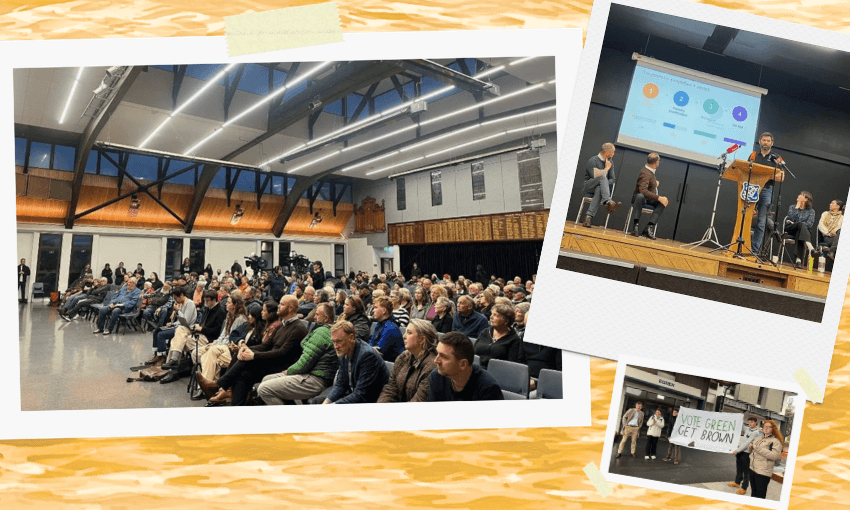Is Simon Bridges working out as National leader? Probably not, says Danyl Mclauchlan, but where is the alternative to catch the caucus eye?
“I’m at the ‘intriguing stranger’ stage of the breakup,” a friend once said to me, while contemplating the terminal phase of an unsatisfactory relationship, explaining, “I have no immediate plans to end it but I do find myself looking at hot strangers and thinking ‘how intriguing.”
It feels like that’s where National is with Simon Bridges. It’s probably not working. He’s blundered into that deadly terrain where so many opposition leaders end their careers: a few bad decisions raise doubts about his judgement; now he has to take risks to demonstrate his leadership qualities – and to stay relevant in the media – but every mistake he makes is amplified, often out of all proportion, until some final, trivial gaffe combined with a bad poll result wipes him out.
Related
Counterpoint: Simon Bridges isn’t going anywhere
There’s no pressing need for his caucus to roll their leader; the party’s overall poll numbers are, reportedly, stable. But didn’t Paula Bennett do surprisingly well in that press conference? Judith Collins has been getting good cut-through: maybe she’d win votes with all these culture-war issues? Or, what if National parachuted some high-profile CEO into Parliament via a by-election in the safe seat of soon-to-be-former Botany MP Jami-Lee Ross and they became the next John Key? So many intriguing options for National’s caucus and strategists!
But also so much risk. Almost every bad leadership decision a political party can make was explored by Labour during its terms in opposition. What if Bridges is National’s David Shearer, clumsy but basically competent, and whoever they replace him with tanks the vote, the way Cunliffe did? Or, what if Bridges is actually Labour’s Andrew Little, just not a viable leader with the public, and over the next 24 months he oversees a gradual but serious decline in his party’s electability? And what if the person they replace him with turns out to be the next Jacinda? Should they wait until closer to the election? Or just get it over with?
On the other hand: what if the next prime minister doesn’t need to be a celebrity? What if Bridges is kind-of-like Jim Bolger? What if the current government tears itself apart and National simply coasts into power? National’s front bench could all be senior ministers in less than two years! And, what if replacing their current, not especially great but basically competent leader creates so much acrimony that it leads to the factionalisation of the party? Endless leaks; bitter and divisive party conferences; the media ripping them apart like bloodcrazed jackals; public contempt; electoral oblivion. What if they just need to keep their cool?
Tough choices. And what complicates this even more is that the decision to roll Bridges won’t be made by cool, detached observers. It’ll probably be made by someone who’s wanted to be prime minister their whole life; who gave up a hell of a lot to go into politics and run for parliament, leaving their firm, where they could have been CEO or managing partner by now; someone who’s spent a lot of time away from home and eaten a lot of shit since they became an MP, and hasn’t been properly recognised for it, hasn’t been given the portfolios they deserve; who said all along that Bridges didn’t have what it takes, and that this whole leak inquiry was a bad idea; someone who knows they’d make a much better leader than Bridges, with his ridiculous mangled vowels, and a better prime minister than Ardern with all her smiling and empty virtue-signalling; someone who feels it would be bad for the party – and bad for the people of New Zealand! – if they didn’t take over National and run it properly. And soon.
That’s an approximation of what most MPs whisper to themselves in the mirror as they do their make-up or knot their ties; and Bridges knows this. The next few weeks could be decisive for him. There’s the release of the leak enquiry, his handling of the whole weird mess will be closely scrutinised; meanwhile, the political media has been generously sensitive about National’s decision to allow one of its senior MPs to disappear on months of taxpayer funded health leave during a moment of crisis for the party, with no clear explanation and an abundance of cryptic hints. That generosity seems unlikely to last.
When the coup comes – if it comes – it won’t be a cool, strategic decision for the good of the party, although it will certainly be defended as one; it will happen in a white-hot rush of panic and ambition and ego and fear. And, if Labour’s time in opposition is anything to go by, the challenger’s own leadership career will almost certainly end the exact same way, when some other intriguing stranger catches their caucus’s eye.





